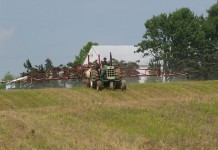Monthly Archives: February 2014
Farmers take care: Drifting herbicides can cause unintended consequences
Farmers should take extra precautions so drifting herbicides do not create unintended consequences on neighboring fields and farms, according to agricultural researchers.
The emerald ash borer has met its match
Woodpeckers find emerald ash borers a handy food source and may slow the spread of this noxious pest, even ultimately controlling it, suggest researchers from the University of Illinois at Chicago.
What can tomatoes teach us about biodiversity? Quite a bit
Scientists are using the genomes of wild tomatoes to study the processes that drive Earth's biodiversity. Their goal is to learn how species cope with differences in climate and natural enemies, and what might happen in this time of environmental change.
Project battles slugfest in field crops
Slugs are one of the most challenging pests faced by no-till field crop growers in the Northeast, but a new Penn State project is looking to contain these pests while benefiting the environment.
New sustainable ag farmers need access, farm management knowledg
On-farm internships and land-link programs are two important models for increasing the number of farmers in the sustainable-agriculture movement, according to researchers in Penn State's College of Agricultural Sciences.
Estes Auctions holds vintage radio auction
BURBANK, Ohio -- Estes Auctions radio sale offered a variety of radio items, and more than 100 bidders from 18 states, Canada, Europe and...
Five agri-stories you should read today 2-20-2014
Here's the agri-stories you should read today, February 20, 2014. Does the chicken industry pit farmer vs. farmer? California cutbacks could eliminate agriculture education. South Dakota's governor has a pitch for California dairy farmers.
HSUS and PETA are the least of your problems
Early February was not a good time to be an American carnivore. First, on Feb. 8, Rancho Feeding Co. of Petaluma, Calif., announced it...
Tired of snow? Think spring and start building a birdhouse
I know it seems like this winter will never end, but days are getting longer, and just a few days ago, I finally saw...
Building, evaluating farm family relations
Success in family businesses is a two-way street — top managers creating an environment in which people can succeed and people taking advantage of...














